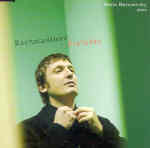At his best, Boris Berezovsky’s gaunt sonority and incisive fingerwork create an edgy, coruscating sound-world akin to what Horowitz, Weissenberg, and Gavrilov have achieved in Rachmaninov Preludes. Telling proof of the pianist’s nervous energy can be found in his pushing of Op. 32 No. 2’s central climax, Op. 32 No. 8’s supple filigree offset by sudden dynamic surges, plus his terse, headlong treatment of slower, more lyrical selections (Op. 23 Nos. 1, 4, & 10; Op. 32 Nos. 10 & 13). Paradoxically, Berezovsky scales down Op. 32 No. 1’s whirling figurations to more intimate, subjective dimensions than usual.
My main reservations concern Mirare’s boxy engineering, plus a not-so-colorful concert grand with an ugly, non-resonant top register. Consequently, Berezovsky’s ferocious grasp of Op. 23 No. 2’s polytextural interplay and truck-sized chords comes off like an orchestra in a broom closet. Yet we must also blame some of the aural fatigue on the pianist’s tendency to pound when the music grows loud (the famous Op. 23 No. 5 March, for example). Among single-disc complete Rachmaninov Preludes editions, Vladimir Ashkenazy’s, with its tonal warmth and caring musicianship, remains a durable point of reference.
































